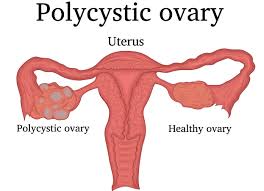Millions of women with polycystic ovary syndrome do not know they have it. The reason is that the signs and symptoms are considered normal issues among women, so it is overlooked. Skipping a period or two may seem normal to you, especially when you are stressed out. However, this is one sneaky sign that you may have polycystic

ovary syndrome. Small cysts on the ovaries cause a hormonal imbalance, which leads to different symptoms. Less than half of all women who have PCOS are actually diagnosed with it. Only about 10% of American women are diagnosed at all. It is an imperceptible condition, but if you do experience any of the following symptoms, you should contact your gynecologist and get evaluated.
The Signs
Polycystic ovary syndrome is often undiagnosed because of the symptoms’ widespread variety and severity. Not all women will check off all these boxes. The most common ones to be aware of are:
- Irregular Periods– Periods can be all over the place, and irregular. Many women face this issue, such as skipping periods, getting them earlier than they should, or longer than normal. If your period is unpredictable, then you might have polycystic ovary syndrome. Very heavy periods can also be a sign of the condition.
- Skin Issues/Acne– If you are getting a lot of acne that includes boils or bumps on your face, armpits, breasts, or groin, then you might have polycystic ovary syndrome. High levels of testosterone caused by PCOS will cause these issues, along with skin tags.
- Excessive Hair Growth– Due to the hormonal imbalance from polycystic ovary syndrome androgens, a type of hormone, are produced by the ovaries. Because of this, a person will grow excessive hair on their face, belly, chest, and back.

Polycystic ovary syndrome can cause thinnking hair, especially on the top crown area. - Thinning Hair– Contrary to earlier, losing hair on the top of your head is also a clear sign of PCOS.
- Weight Gain– Gaining unexplained weight may be an indication of polycystic ovary syndrome. The weight will typically appear around your abdomen. This is due to the high insulin levels present that the condition produces.
- Ring Around Your Neck– A dark ring that forms around your neck, or anywhere on your skin that us hard to wash off is a sign of PCOS. It usually occurs on the back of your neck, and under your arms.
- Fertility Issues– Because of irregular periods, and hormonal imbalance from the condition, it worsens conditions for the body to ovulate normally. PCOS is the most common cause of infertility, and responsible for 70% of infertility issues in women. The egg that is released (ovulation) usually does not occur or is irregular.
If you suspect that you have polycystic ovary syndrome, then it is urgent that you see your gynecologist right away. If you do have the condition, then you are at a high risk of developing other major health issues. Women with PCOS are at risk for type 2 diabetes, high blood pressure, high cholesterol, sleep apnea, and depression. Polycystic ovary syndrome is a silent condition that often goes undiagnosed. Review the symptoms, speak up and get evaluated.